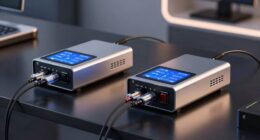If you’re looking to build your own DIY BMS kits in 2025, there’s a wide range of options, from smart BMS units like DALY and JKBMS with remote monitoring to compact protection boards like the 6S 15A PCB BMS. You’ll also find modular battery kits with inverters, Bluetooth features, and specialized storage solutions like the XBERSTAR boxes. Keep in mind factors like compatibility and safety. Stick around to find out which kits suit your needs perfectly.
Key Takeaways
- Popular DIY BMS kits include modular, stackable options like XBERSTAR and 18650 battery holders for customizable configurations.
- Many DIY BMS kits feature Bluetooth, Wi-Fi, or RS485 connectivity for remote monitoring and control.
- Some kits, such as PCS 6S, offer basic protection with high-power MOSFETs, suitable for 18650 packs.
- Compatibility with LiFePO4, Li-ion, and LTO chemistries makes these kits versatile for various DIY battery projects.
- Consider ease of assembly, documentation, and cooling solutions when selecting DIY BMS kits for 2025.
DALY Smart BMS for Lithium Battery Pack

If you’re looking for a versatile BMS solution to protect and manage your lithium battery pack, the Daly Smart BMS for 4S-16S setups is a solid choice, especially if you value remote monitoring and compatibility with mainstream inverters. It supports LiFePO4 batteries and offers protection against overcharging, overdischarging, overcurrent, short circuits, and extreme temperatures. The built-in CAN/485 bus communication makes integration straightforward, while the Bluetooth/Wi-Fi dongle allows remote control via mobile app or PC. However, users report mixed reliability, some overheating issues, and challenges with app connectivity. It’s a good balancing tool but may need supplementary cooling or custom solutions for long-term stability.
Best For: DIY enthusiasts and small-scale energy system users seeking remote monitoring and basic protection for LiFePO4 battery packs.
Pros:
- Supports a wide range of LiFePO4 configurations with built-in balancing capabilities
- Offers remote monitoring and parameter adjustment via Bluetooth/Wi-Fi dongle
- Compatible with mainstream inverters and features CAN/485 communication for easy integration
Cons:
- Inconsistent reliability with some units experiencing early failures or overheating
- App connectivity and user interface are often reported as poor and difficult to use
- Lack of cooling solutions and limited documentation can lead to installation and long-term stability challenges
JKBMS Smart BMS for Lithium Battery Packs
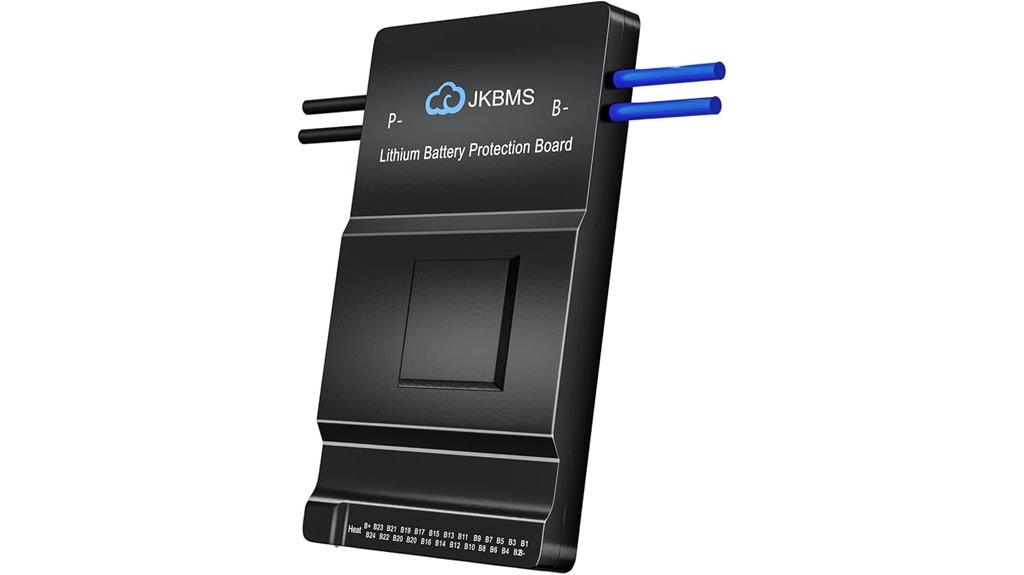
The JKBMS Smart BMS stands out as an excellent choice for DIY enthusiasts seeking a reliable, feature-rich solution for lithium battery packs. It supports 8S to 20S configurations with a 100A current and active balancing, which can recover up to 20% capacity. The Bluetooth and RS485 connectivity make monitoring and control straightforward via the mobile app, compatible with Android and iOS. Its protection features guard against overcharge, overdischarge, overcurrent, and temperature extremes. Easy to install, it suits various chemistries like Li-ion, LiFePO4, and LTO, making it versatile for EVs, solar setups, or micro EVs. Overall, a solid, user-friendly BMS with good capacity recovery.
Best For: DIY enthusiasts and electric vehicle builders seeking a reliable, feature-rich BMS with active balancing and versatile connectivity options.
Pros:
- Supports 8S to 20S configurations with 100A current and active balancing that can recover up to 20% capacity.
- Bluetooth and RS485 connectivity for easy monitoring and control via user-friendly mobile app on Android and iOS.
- Compatible with multiple battery chemistries including Li-ion, LiFePO4, and LTO, suitable for various applications like EVs and solar systems.
Cons:
- RS485 converter is not included, requiring additional purchase for some communication setups.
- Manual instructions have small font, which may be difficult to read during installation.
- Heater activation conditions can be unclear, and app permissions may include location sharing, raising privacy considerations.
4PCS 6S 15A 24V PCB BMS Battery Protection Board for Li-ion Lithium 18650 Battery Packs
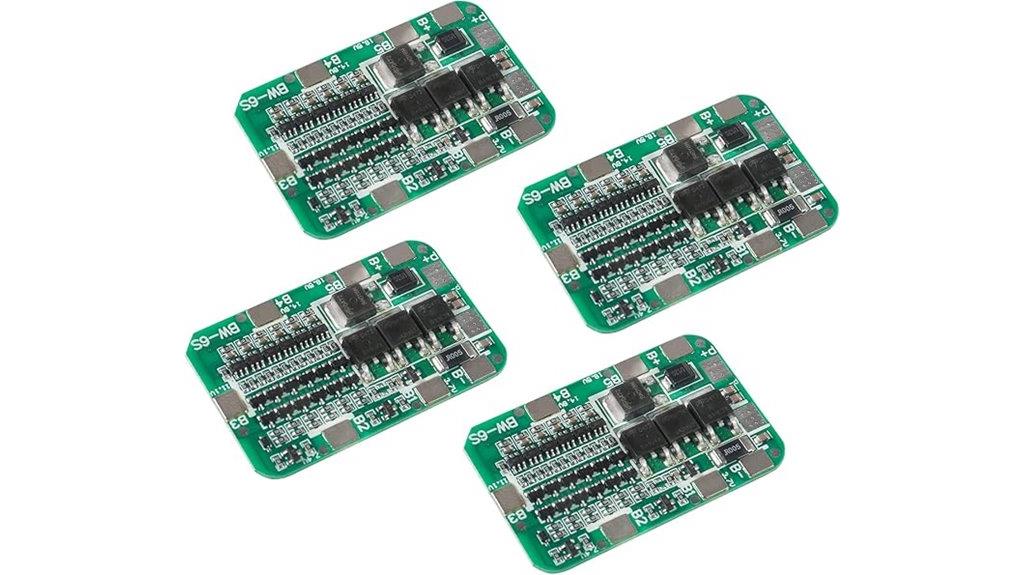
The PCS 6S 15A 24V PCB BMS Battery Protection Board is an excellent choice for DIY enthusiasts building or upgrading lithium-ion 18650 battery packs, especially when reliable overcharge and over-discharge protection are priorities. These durable boards feature low internal resistance, high-power MOSFETs, and low standby current, ensuring efficient operation. They protect against overcurrent, short circuits, high temperatures, and voltage fluctuations. Supporting up to 15A discharge current and 25A instantaneous pulses, they’re suitable for various applications like solar systems and backup power. Compact at 50×30×2mm, they’re easy to integrate into custom packs, providing safety and longevity.
Best For: DIY enthusiasts and hobbyists building or upgrading lithium-ion 18650 battery packs seeking reliable overcharge, over-discharge, and short circuit protection.
Pros:
- Provides comprehensive protection against overcharge, overdischarge, overcurrent, and short circuits, enhancing battery safety.
- Compact design (50×30×2mm) makes it easy to integrate into various custom battery packs.
- Low standby current and high-power MOSFETs ensure efficient operation and minimal power loss during use.
Cons:
- Some users report inconsistency in manufacturing quality, with occasional defective units.
- Lacks built-in balancing features, which are often desirable for maintaining uniform cell voltage in multi-cell packs.
- Limited to a maximum discharge current of 15A, which may not be sufficient for high-power applications.
48V 16S 15kWh LiFePO4 Battery Kit with Inverter and LCD
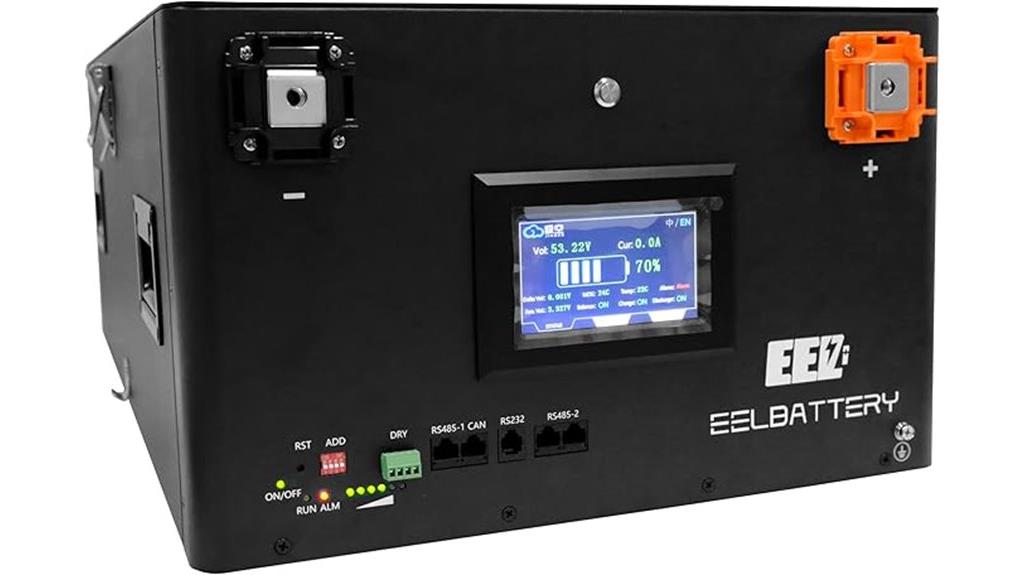
Designed for DIY enthusiasts and professionals alike, the V 16S 15kWh LiFePO4 Battery Kit with Inverter and LCD offers an all-encompassing, ready-to-assemble energy storage solution. Its 48V, stackable design supports easy expansion, making it ideal for server, solar, and other power needs. Built from durable stainless steel, it measures 415*700*263mm, combining strength with sleek aesthetics. The integrated JK inverter, 2A active balance, and 200A BMS ensure reliable performance. With CANBUS and RS485 interfaces, system monitoring and integration are seamless. This kit simplifies transportation, installation, and scalability, providing long-lasting, stable power in a compact package.
Best For: DIY enthusiasts and professionals seeking a scalable, reliable energy storage solution for server, solar, and other power applications.
Pros:
- Stackable design allows easy expansion and customization.
- Built-in JK inverter, active balance, and 200A BMS ensure reliable performance.
- Durable stainless steel construction combines strength with modern aesthetics.
Cons:
- Bulk packaging may require additional effort for transportation and setup.
- Compatibility limited to LiFePO4 cells within 280Ah to 330Ah range.
- Requires technical knowledge for integration with existing systems due to communication interfaces.
XBERSTAR Li-Ion Battery Storage Box for 18650 Cells
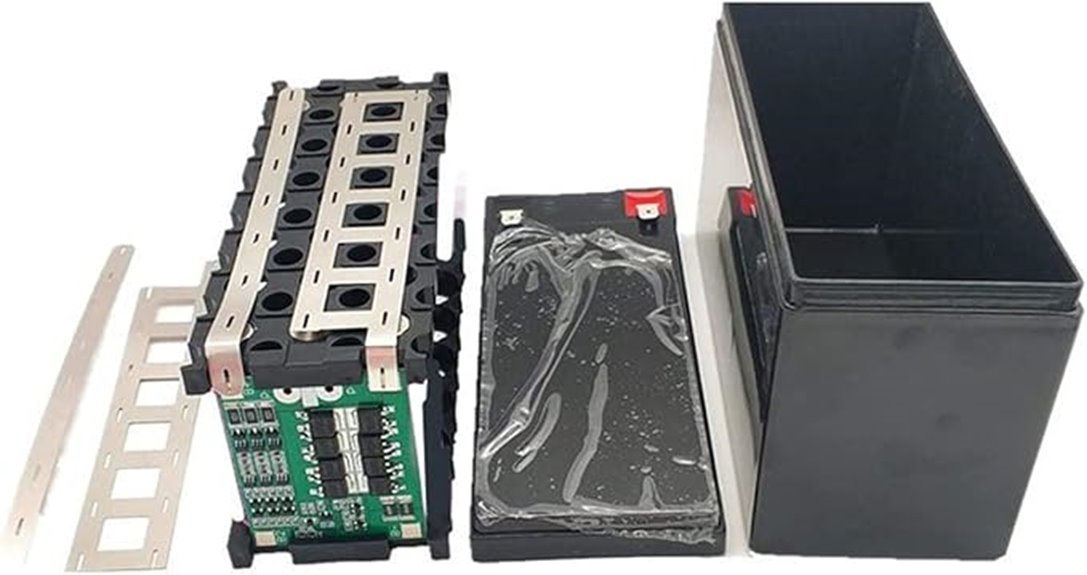
If you’re comfortable with some modification and careful assembly, the XBERSTAR Li-Ion Battery Storage Box is a solid choice for building 12V lithium-ion battery packs from 18650 cells. It features a compact plastic case that can hold up to 21 cells, suitable for powering 12V DC devices. The kit includes nickel strips and a BMS board, but requires batteries and tools like a spot welder. Users report that the case and holder often need grinding or enlarging holes for proper fit and safety, as forcing batteries in can cause warping or shorts. Despite assembly challenges, it offers a customizable solution for DIY battery packs.
Best For: DIY enthusiasts who are comfortable with modifications and assembling custom 12V lithium-ion battery packs using 18650 cells.
Pros:
- Includes all necessary components except batteries, making it convenient for custom builds.
- Supports building 12V packs suitable for powering DC peripherals like routers and switches.
- Reliable spot-welded nickel strips and a functioning BMS ensure safety and performance.
Cons:
- Requires modifications such as grinding or enlarging holes in the case for proper fit and safety.
- Plastic case can warp or damage if batteries are forced in, posing safety risks.
- Assembly can be challenging, and the plastic case and holder may not fit batteries perfectly without adjustments.
XBERSTAR 18650 Battery Holder for Lithium-ion Battery Pack
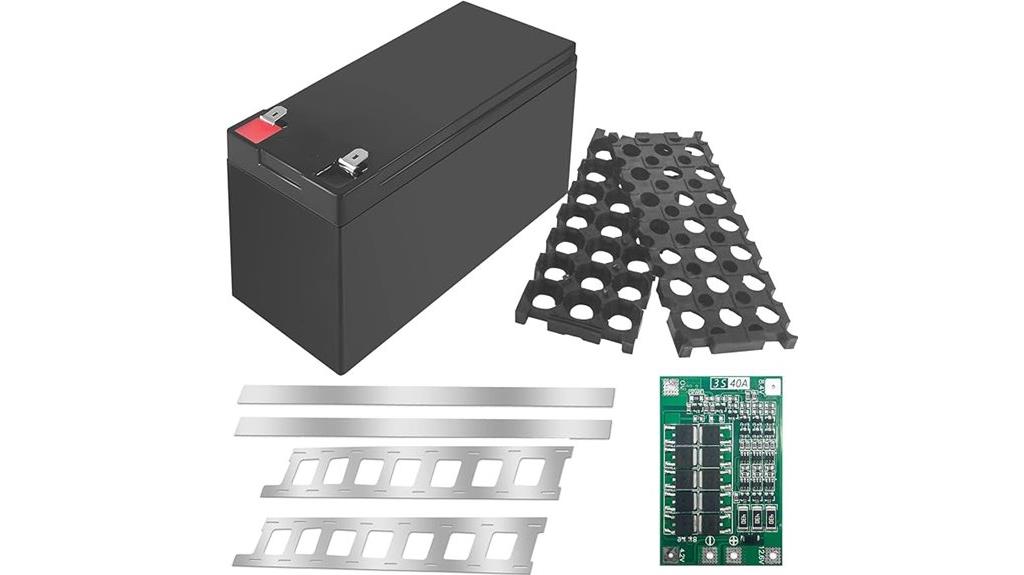
For anyone building a custom lithium-ion battery pack, the XBERSTAR 18650 Battery Holder offers a reliable and flexible solution. It’s designed specifically for 18650 cells and supports configurations like 12V 3S 7P, holding up to 21 batteries. Made from durable ABS plastic, it’s easy to assemble and provides a firm, professional connection without adhesives. The kit includes a black box, nickel strips, and a BMS, with positive and negative shrapnel for seamless wiring. This holder guarantees a secure, organized, and maintainable pack, making it ideal for DIY projects and powerwall systems. It simplifies assembly while enhancing overall reliability.
Best For: DIY enthusiasts and professionals building custom lithium-ion battery packs for powerwall systems or portable energy solutions.
Pros:
- Durable ABS plastic construction ensures long-lasting use and easy assembly
- Supports flexible configurations up to 12V 3S 7P with up to 21 batteries
- Includes essential components like black box, nickel strips, and BMS for complete setup
Cons:
- Batteries are not included, requiring additional purchase
- Assembly may require some technical knowledge for proper wiring and connection
- Limited to 18650 cells, not compatible with other battery types
DIY Solar Charging Kit for Lithium Batteries
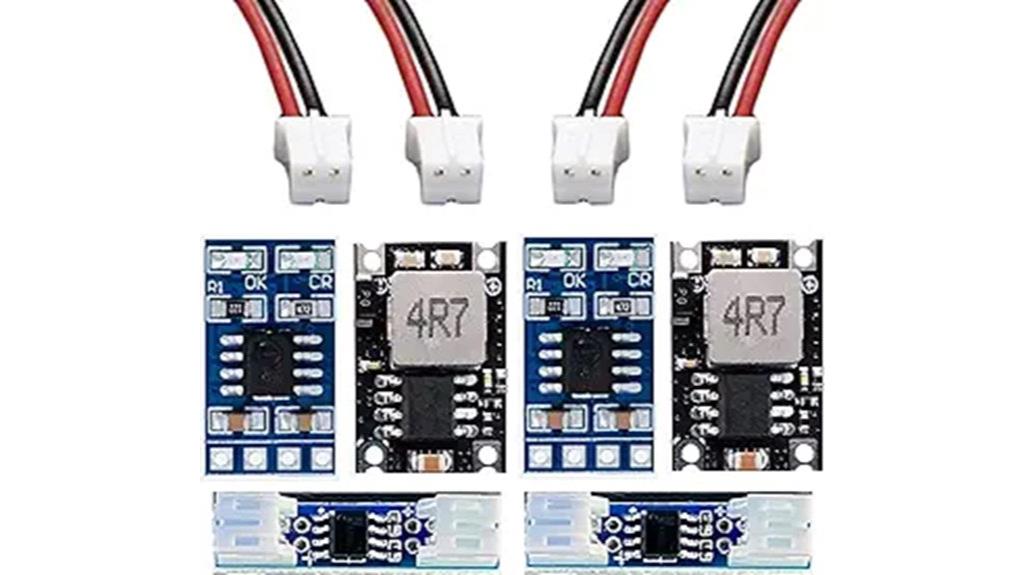
Looking to harness solar power efficiently for small lithium battery projects? I recommend the DIY Solar Charging Kit, which includes MPPT chargers, DC-DC Buck converters, protection modules, and JST cables. The MPPT boards maximize charging efficiency with a 4.2V output and 1A current, ensuring *best* power conversion. The Li-Protect module safeguards batteries from overcharge and deep discharge, extending their lifespan. Designed for DIY electronics, it’s perfect for IoT devices, wearables, Raspberry Pi projects, and small solar systems. With easy-to-connect JST cables, setup is straightforward, making this kit ideal for reliable, efficient solar-powered prototypes and small-scale energy harvesting projects.
Best For: DIY electronics enthusiasts, IoT developers, and small-scale solar-powered project enthusiasts seeking reliable energy harvesting and protection solutions.
Pros:
- High-efficiency MPPT chargers with 4.2V output and 1A current for optimal solar charging.
- Comprehensive protection with Li-Protect module ensures battery safety and longevity.
- Easy setup with JST cables facilitates quick and reliable connections to various devices.
Cons:
- Limited to small-scale projects and may not support large or high-power applications.
- Requires basic knowledge of electronics for proper integration and setup.
- May need additional components or customization for specific advanced applications.
51.2/48V Lifepo4 Battery DIY Box Kit with Bluetooth BMS for Backup Power and PV Self-Use
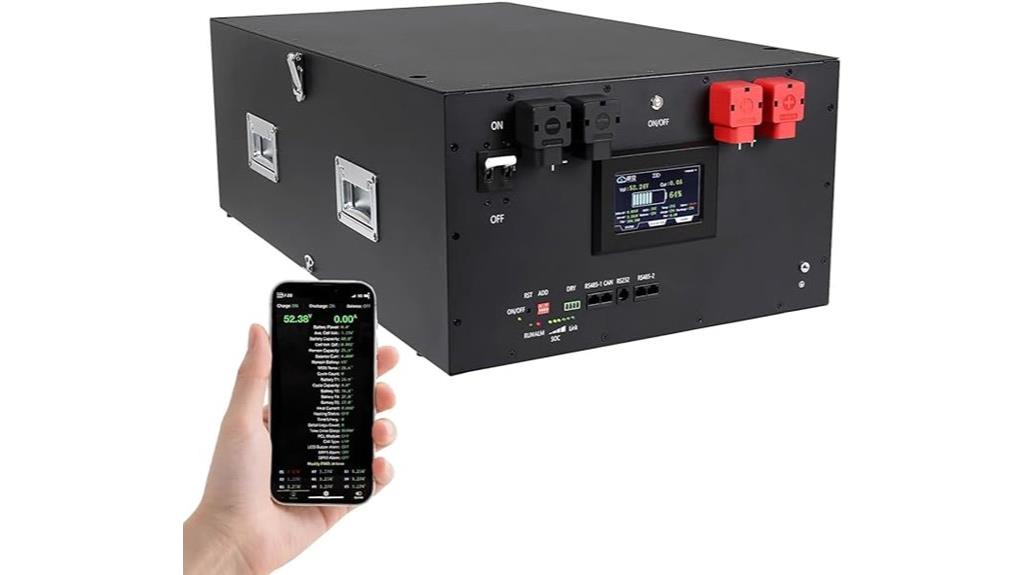
The 2/48V Lifepo4 Battery DIY Box Kit with Bluetooth BMS is an excellent choice for those seeking customizable, high-capacity energy storage solutions. It offers options from 280Ah to 320Ah, supporting up to 16 batteries per box and stacking in four layers for larger capacity needs. Perfect for backup power, PV self-use, and grid services, it features built-in protections against overcurrent, temperature, and voltage issues. The plug-and-play design with auto-recognition simplifies expansion, compatible with major inverters like Growatt and Pylon. With broad operating temperatures and rugged IP21 protection, this kit ensures durability in various environments.
Best For: DIY enthusiasts, off-grid homeowners, and small-scale energy users seeking customizable, high-capacity battery storage solutions with versatile applications.
Pros:
- Supports large capacity configurations up to 320Ah and stackable in four layers for scalable energy storage.
- Compatible with major inverter brands like Growatt and Pylon, with plug-and-play expansion and auto-recognition.
- Wide operating temperature range and IP21 protection ensure durability in various environments.
Cons:
- First available in July 2025, so immediate purchase options may not be accessible yet.
- Requires some technical knowledge for optimal configuration and integration.
- Limited to 16 batteries per box, which might constrain extremely large energy storage needs without multiple units.
LiFePO4 Battery Pack Kit with Embedded BMS for RVs and Off-Grid Systems
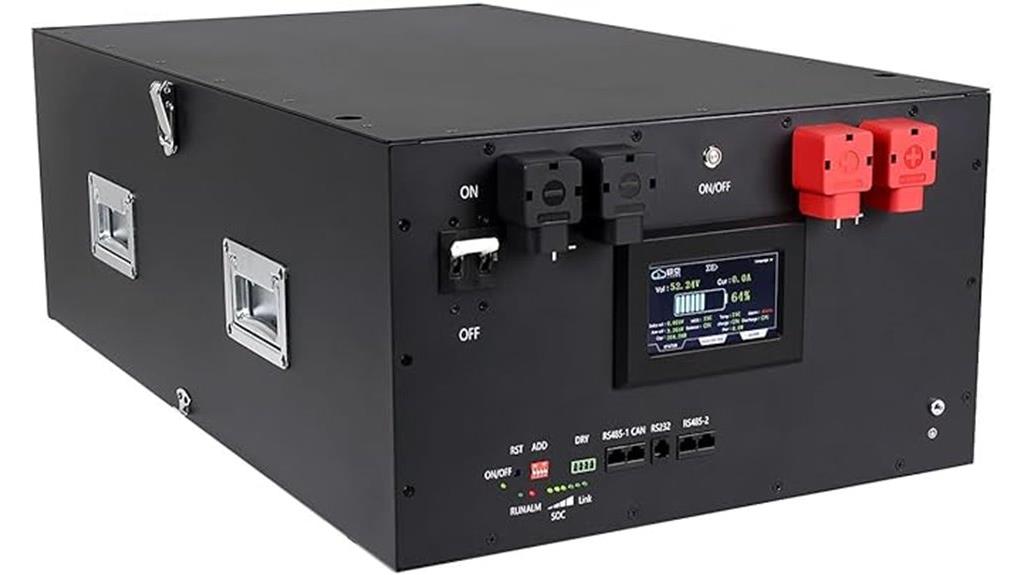
If you’re seeking a reliable, high-capacity energy storage solution for RVs or off-grid systems, the LiFePO4 Battery Pack Kit with Embedded BMS is an excellent option. It offers DIY 51.2V lithium iron phosphate packs with capacities from 280Ah to 320Ah, expandable by stacking up to 16 batteries. Its smart energy management supports solar self-use, grid interaction, and peak shaving to cut electricity costs. The built-in BMS guarantees safety with protections against overcurrent, overheating, and imbalance, plus remote smartphone monitoring. Compatible with multiple inverter brands and communication protocols, this kit provides a versatile, scalable, and reliable power solution for off-grid living or mobile setups.
Best For: RV owners, off-grid dwellers, and DIY enthusiasts seeking a scalable, safe, and efficient energy storage solution for mobile or remote applications.
Pros:
- High-capacity, customizable configurations up to 320Ah with stacking options for extended energy storage
- Advanced BMS with remote smartphone monitoring ensures safety and real-time system oversight
- Compatible with multiple inverter brands and communication protocols for flexible system integration
Cons:
- Product does not include wheels, requiring additional components for mobility or installation
- Larger setups may require careful planning for stacking and space management
- As a DIY kit, installation and setup may require technical knowledge or professional assistance
XBERSTAR 18650 Power Bank Case, Li-Ion Battery Storage Box

The XBERSTAR 18650 Power Bank Case is an ideal choice for DIY enthusiasts with basic electrical skills who want to assemble their own portable Li-Ion battery pack. It features a sturdy battery holder with wire leads, making soldering and connection straightforward. The kit includes a 3S 40A BMS, US charger, and nickel strips—batteries are not included. Installation is simple; just insert batteries in the correct orientation and connect according to the markings. While it’s well-suited for DIY projects and UPS applications, some users report missing components and limited instructions, so a basic understanding of electrical assembly is essential for successful setup.
Best For: DIY enthusiasts with basic electrical skills seeking to assemble their own portable Li-Ion battery packs for custom projects or UPS applications.
Pros:
- Easy to solder and connect with included wire leads and high-quality battery holder
- Compatible with 3 batteries and includes essential components like BMS and nickel strips
- Well-suited for DIY projects and UPS applications with straightforward installation
Cons:
- Lacks detailed assembly instructions, requiring prior electrical knowledge
- Some users report missing components such as chargers and limited support from seller
- Not recommended for beginners without electrical experience due to assembly complexity
51.2V LiFePO4 Battery Pack with BMS for RV, Camping, Marine, Home
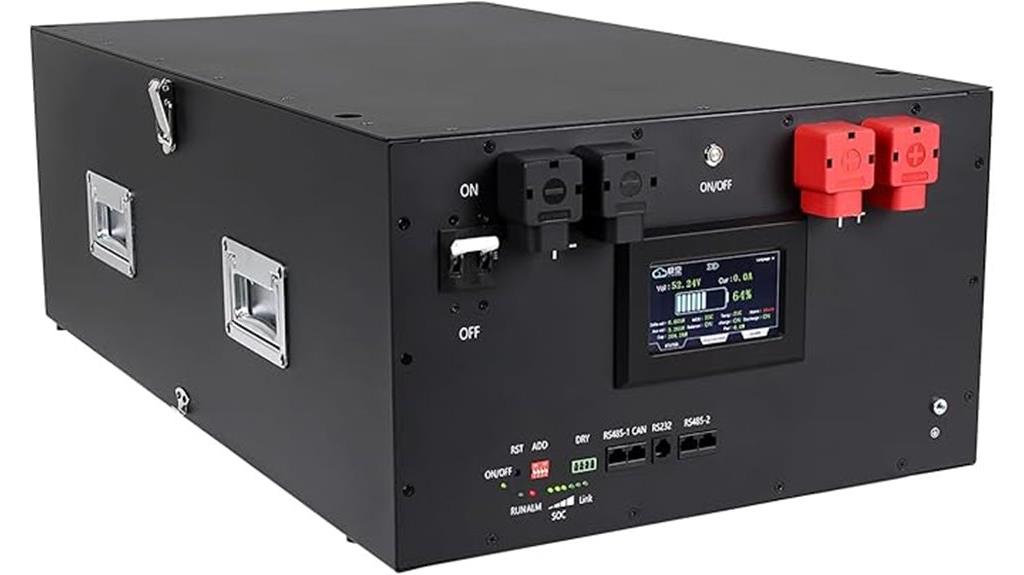
For anyone looking to build a reliable and customizable energy storage solution, the 51.2V LiFePO4 Battery Pack with BMS is an excellent choice, especially for RV, camping, marine, or home use. It offers capacities from 280Ah to 320Ah and features a modular, stackable design supporting up to 16 batteries and four layers for large-scale storage. It’s versatile for solar self-consumption, peak shaving, or backup power during outages. The IP21-rated enclosure, integrated BMS, and compatibility with popular inverters guarantee safety, durability, and easy expansion. Its plug-and-play setup makes it straightforward to install, providing a flexible, efficient energy solution tailored to your needs.
Best For: individuals seeking a customizable, high-capacity energy storage solution for RVs, camping, marine applications, or home use.
Pros:
- Modular and stackable design supports large-scale energy storage and easy expansion.
- Wide operating temperature range and integrated BMS ensure safety, durability, and reliable performance.
- Compatible with multiple popular inverters and supports plug-and-play installation for convenience.
Cons:
- IP21 rated, offering limited protection against dust and water, which may not suit all outdoor environments.
- Slightly larger dimensions may require adequate space for installation.
- Availability and shipping details might vary, and premium features may come at a higher cost.
4PCS 6S 15A 24V PCB BMS Battery Protection Board for Li-ion Lithium 18650 Battery Packs
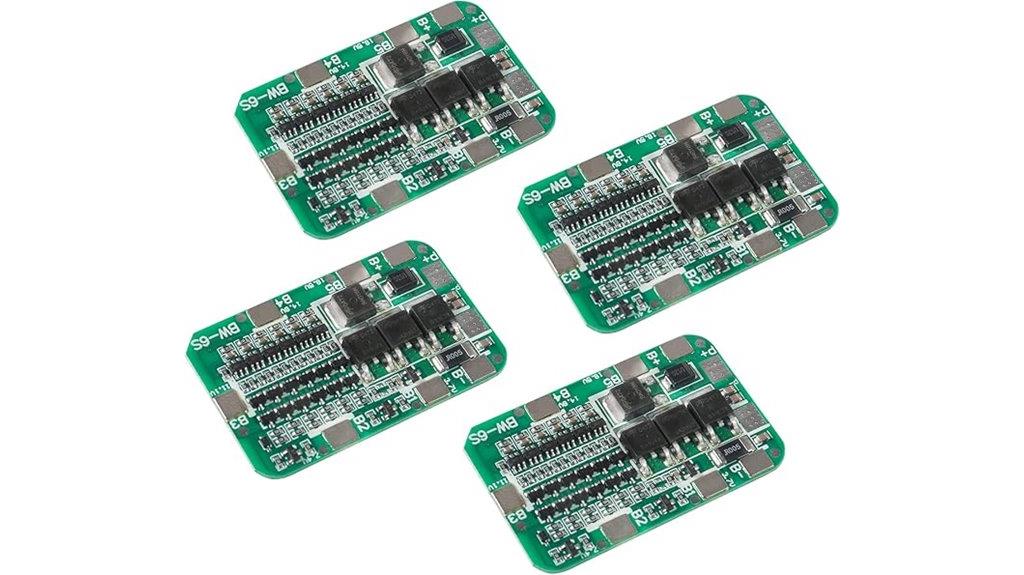
Designed for DIY enthusiasts building or upgrading lithium-ion battery packs, the PCS 6S 15A 24V PCB BMS provides reliable protection without complicated features. This compact board supports 6-series 18650 packs, offering overcharge, over-discharge, overcurrent, short circuit, and temperature protections. With low internal resistance and high-power MOSFETs, it ensures safe and efficient operation, handling up to 15A continuous discharge and 25A instant peaks. Easy to wire and install, it’s suitable for various projects like solar systems, backup power, and e-bike batteries. While it lacks balancing features, its durability and protection capabilities make it a popular choice for DIY battery builders.
Best For: DIY enthusiasts and hobbyists building or upgrading lithium-ion 18650 battery packs who need reliable, straightforward protection without advanced balancing features.
Pros:
- Provides comprehensive protection against overcharge, over-discharge, overcurrent, short circuits, and high temperatures.
- Supports high current loads with 15A continuous and 25A peak discharge capabilities.
- Compact and easy to wire, suitable for various DIY projects like solar systems and backup power.
Cons:
- Lacks built-in balancing features, which are important for maintaining battery health in larger packs.
- Some units may experience manufacturing defects or shipping damage, affecting reliability.
- Limited to protection functions without additional features such as monitoring or balancing, which might be necessary for certain applications.
EEL 48V LiFePO4 Battery Box Kits with Bluetooth BMS
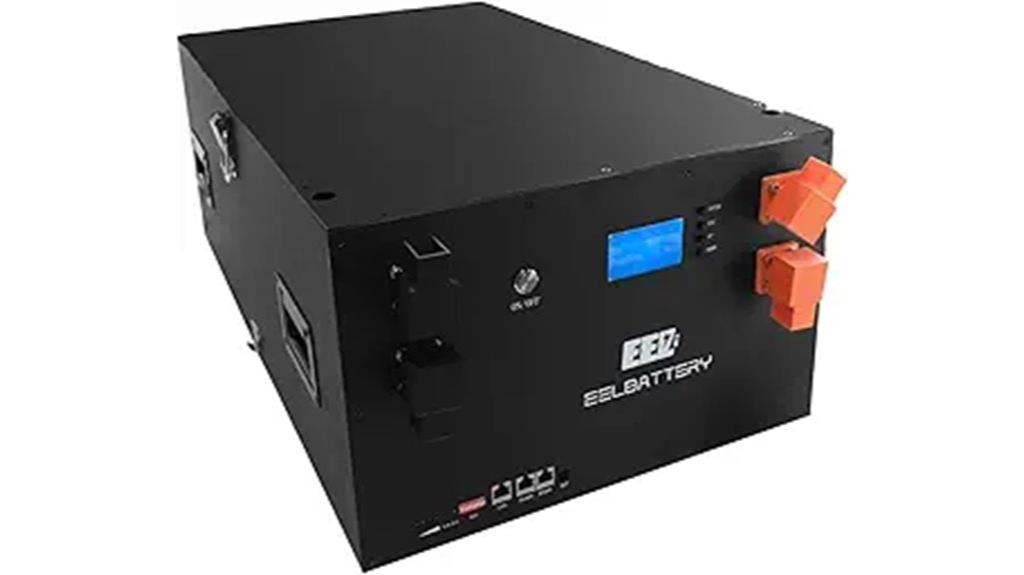
If you’re a DIY enthusiast looking to build a reliable, customizable energy storage system, EEL’s 48V LiFePO4 Battery Box Kits with Bluetooth BMS stand out as an excellent choice. These kits support 15kWh solar storage, compatible with 280Ah to 302Ah LiFePO4 cells, perfect for RVs, cabins, or off-grid setups. Made from durable, anti-oxidation aluminum alloy, they’re built for outdoor use. The integrated Bluetooth BMS offers real-time monitoring via smartphone, protecting against overcharge, over-discharge, and short circuits. Easy to assemble, with included parts, these kits provide a safe, maintenance-free solution for reliable backup power and outdoor applications.
Best For: DIY enthusiasts and off-grid power users seeking a customizable, reliable, and safe 15kWh solar energy storage solution with real-time monitoring.
Pros:
- Supports large capacity (15kWh) with compatibility for 280Ah to 302Ah LiFePO4 cells
- Durable construction from anti-oxidation aluminum alloy suitable for outdoor use
- Integrated Bluetooth BMS enables real-time monitoring via smartphone app for enhanced safety and management
Cons:
- May require customization, such as fabricating buss bars depending on the cell type used
- Limited software details provided for Bluetooth app, potentially affecting user experience
- Slightly heavy at approximately 63.8 pounds, which could impact portability or installation ease
10 Pack Lithium Battery Charger Modules with BMS and USB 5V 1A
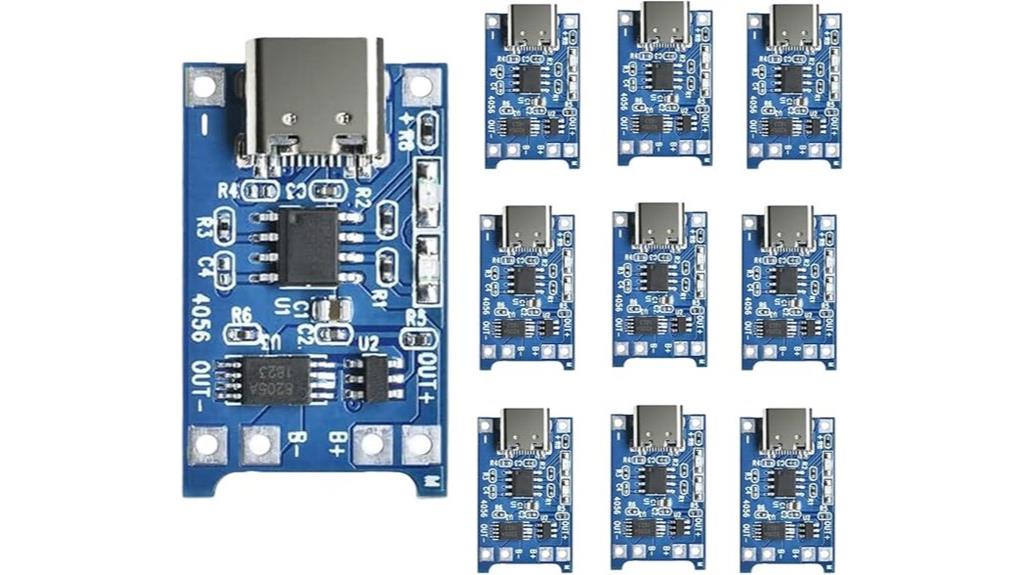
The Pack Lithium Battery Charger Modules with BMS and USB 5V 1A are ideal for DIY enthusiasts seeking a reliable and easy-to-use solution for managing lithium battery packs. These 18650 charger modules come in a 10-pack, featuring integrated BMS boards with dual protection functions, including over-discharge and over-current safeguards. They use the TP4056 chip and support USB 5V 1A charging via Type-C input. Easy to wire with solder joints, they combine both charging and discharging protection, making them perfect for custom battery projects. Their compact size and indicator lights simplify monitoring, ensuring safe and efficient operation in your DIY power setups.
Best For: DIY electronics enthusiasts and hobbyists seeking reliable lithium battery management solutions for custom projects.
Pros:
- Includes integrated BMS with dual protection functions for safety and reliability
- Supports USB 5V 1A charging with easy wiring via solder joints
- Compact size with LED indicators for simple monitoring of charging status
Cons:
- Limited to 5V input, may require additional adapters for other power sources
- Only supports a maximum charge current of 1000mA, possibly slow for high-capacity batteries
- Requires basic soldering skills for installation and wiring
EEL 48V JK V5 DIY Box Kit with Bluetooth and BMS

For anyone building a reliable off-grid or backup power system, the EEL 48V JK V5 DIY Box Kit with Bluetooth and BMS stands out as an excellent choice. It supports up to 280Ah capacity, making it versatile for solar, RV, or home energy storage. The kit features a built-in BMS that safeguards against overcharging, over-discharging, and temperature extremes, plus a 250A fuse for added safety. With Bluetooth and Wi-Fi connectivity, you can monitor and adjust settings remotely via app or PC. Its high-definition display shows real-time data, and assembly is straightforward, praised by users despite minor instruction typos. It’s a reliable, user-friendly solution.
Best For: DIY enthusiasts and off-grid or backup power system builders seeking a versatile, safe, and easily monitored battery solution.
Pros:
- Supports up to 280Ah capacity, suitable for various applications like solar and RV setups
- Equipped with comprehensive BMS and safety features, including a 250A fuse and temperature protections
- Offers Bluetooth and Wi-Fi connectivity for remote monitoring and adjustment via app or PC
Cons:
- Minor typos in assembly instructions may require careful attention during setup
- Large size and weight (63.8 pounds) may pose handling and installation challenges
- Requires a torque wrench for proper mounting and assembly to avoid damage
Factors to Consider When Choosing a DIY BMS Kit
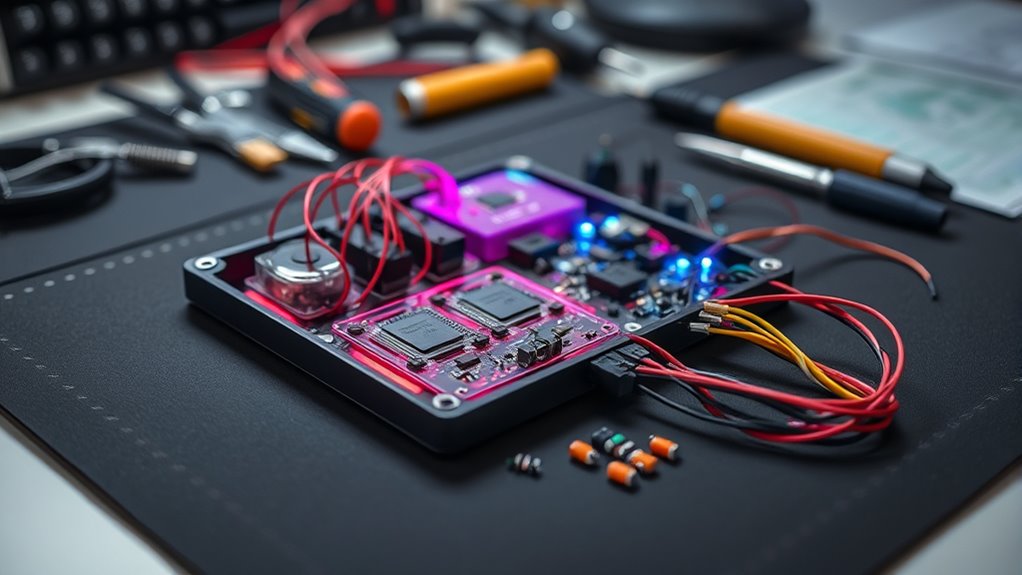
When choosing a DIY BMS kit, I focus on how well it matches my battery setup and the features it offers for monitoring and control. Safety is vital, so I check for protection measures and how easy it is to install and wire. Durability and build quality also matter to guarantee my system stays reliable over time.
Compatibility With Batteries
Choosing a DIY BMS kit that matches your battery chemistry is vital for safe and efficient performance. Different chemistries like LiFePO4, Li-ion, or LTO require specific BMS support to ensure proper balancing, protection, and longevity. You also need to confirm that the BMS’s voltage and cell count are compatible with your pack’s configuration—whether 4S, 8S, or 16S. The maximum current rating should meet your peak demands, such as 40A or 200A, to prevent overloads. Additionally, consider the physical size and cell dimensions to ensure the BMS fits your setup. Finally, verify that the BMS supports communication protocols like Bluetooth or CANbus if you plan to integrate monitoring or control systems. Compatibility is key to a safe, reliable DIY battery system.
Monitoring and Control Features
Selecting a DIY BMS kit with robust monitoring and control features is vital for maintaining battery safety and performance. I look for systems that offer real-time monitoring through apps or interfaces like Bluetooth, Wi-Fi, RS485, or CANbus, making it easy to track essential parameters. Detailed data displays, including voltage, current, SOC, temperature, and individual cell voltages, are indispensable for accurate assessment. Control features such as manual balancing, overcharge/discharge limits, and adjustable parameters should be accessible via user-friendly software or hardware controls. Remote access capabilities for alerts and notifications help me manage the system efficiently. Additionally, firmware updates or software upgrades ensure the BMS stays current, improving functionality and security over time. These features collectively provide reliable oversight of my battery system.
Safety and Protection Measures
How can I guarantee my DIY battery system stays safe? The key is choosing a BMS with extensive protection features. Look for kits that guard against overcharge, overdischarge, overcurrent, short circuits, and temperature extremes. Safety features like automatic cutoff and temperature sensors are vital to prevent thermal runaway and damage from overheating or cold conditions. Always select BMS units that meet safety standards such as ISO, FCC, CE, or RoHS, ensuring they comply with international safety regulations. Active balancing helps maintain cell health and prevents dangerous imbalances. Additionally, proper insulation, fuse integration, and clear wiring diagrams are necessary for minimizing electrical faults and protecting users during assembly and operation. Prioritizing these safety measures ensures a reliable, secure DIY battery system.
Installation and Wiring Ease
When installing a DIY BMS kit, ease of wiring plays a crucial role in guaranteeing a smooth and safe setup process. I look for kits that come with clear, labeled wiring diagrams and color-coded cables, which make connections straightforward. Plug-and-play features or connectors that reduce soldering are a huge plus, saving time and minimizing errors. It’s essential the kit supports my battery configuration, whether 4S, 8S, or 16S, with compatible terminal and wiring layouts. I also check that the wiring length and flexibility are sufficient to reach all cells comfortably without stress or strain. Lastly, I prefer designs that allow easy access for maintenance or future modifications, avoiding complex disassembly. These factors help streamline installation and ensure reliability.
Durability and Build Quality
Durability and build quality are critical factors when choosing a DIY BMS kit because they directly affect the system’s longevity and safety. A robust kit should use high-quality materials like sturdy circuit boards and corrosion-resistant connectors to withstand environmental stress. You can gauge build quality by inspecting soldering standards, the stability of the casing, and the reliability of internal components such as MOSFETs and resistors. Well-made kits often feature reinforced wiring harnesses and secure mounting options, preventing damage during installation or operation. Durability is demonstrated by consistent performance over time without overheating, component failures, or signal issues. Additionally, choosing a kit that complies with safety certifications like ISO, FCC, RoHS, or CE ensures it meets industry standards for electrical and mechanical robustness.
Frequently Asked Questions
How Do DIY BMS Kits Impact Battery Lifespan?
DIY BMS kits can greatly extend your battery’s lifespan if installed and used correctly. They monitor voltage, temperature, and current, preventing overcharging or deep discharges that damage cells. By maintaining ideal conditions, these kits help avoid battery degradation over time. I’ve found that a well-built DIY BMS ensures your battery stays balanced and healthy, ultimately saving you money and hassle in the long run.
Are DIY BMS Kits Suitable for High-Capacity Battery Packs?
Absolutely, DIY BMS kits are suitable for high-capacity battery packs, but with some caution. I’ve found that they work well if you carefully select a kit designed for larger, more demanding setups. Just remember, bigger packs mean more complexity and potential pitfalls. So, I recommend doing thorough research, double-checking specifications, and being prepared for more meticulous monitoring. That way, you guarantee safe, stable, and sustainable power performance.
Can I Upgrade or Customize a DIY BMS Kit Later?
Yes, you can upgrade or customize a DIY BMS kit later, but it depends on the kit’s design and compatibility. I recommend choosing a modular BMS that allows for easy expansion or adjustment. Always check the specifications and compatibility before making modifications. I’ve found that planning ahead and selecting flexible kits helps make sure you can upgrade your system without major issues down the line.
What Safety Features Are Included in DIY BMS Kits?
Your safety is my top priority, so DIY BMS kits pack incredible features like over-voltage, under-voltage, over-current, and short-circuit protection that can save your project from disaster. They often include temperature monitoring to prevent overheating and balance circuits to keep cells equally charged. These features act like a superhero team, guarding your battery system 24/7. Trust me, these safety features are essential for peace of mind and reliable performance.
How Do I Troubleshoot Issues With My DIY BMS Kit?
When troubleshooting your DIY BMS kit, I first check all connections to guarantee they’re secure and free of corrosion. I then use a multimeter to verify voltage levels and look for any blown fuses or damaged wires. If issues persist, I consult the manual for error codes or software alerts, and I test individual components like temperature sensors and MOSFETs. Remember, patience and methodical checks are key!
Conclusion
Building your own BMS kit can be a rewarding experience, giving you control over your battery system. With so many options out there, isn’t it exciting to think you can customize and optimize your setup? Whether you’re a beginner or a seasoned DIYer, choosing the right kit makes all the difference. So, why not take the plunge and create a power solution tailored just for you? The possibilities are endless—are you ready to get started?










